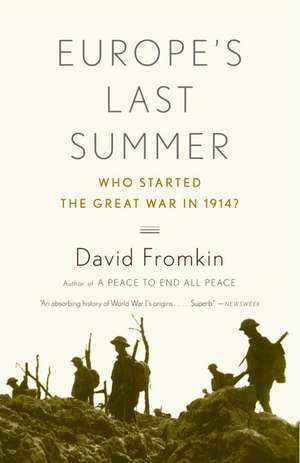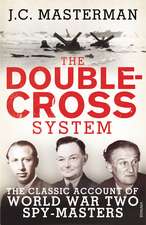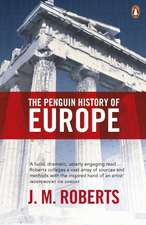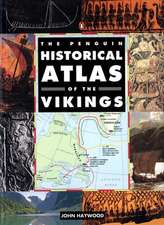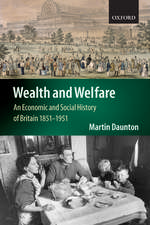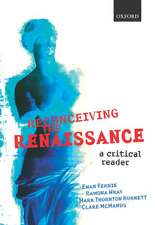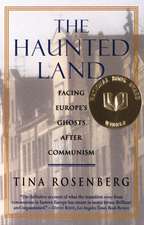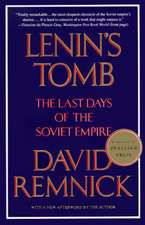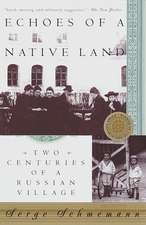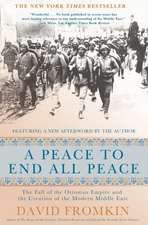Europe's Last Summer: Who Started the Great War in 1914?
Autor David Fromkinen Limba Engleză Paperback – 28 feb 2005
In Europe’s Last Summer, David Fromkin provides a different answer: hostilities were commenced deliberately. In a riveting re-creation of the run-up to war, Fromkin shows how German generals, seeing war as inevitable, manipulated events to precipitate a conflict waged on their own terms. Moving deftly between diplomats, generals, and rulers across Europe, he makes the complex diplomatic negotiations accessible and immediate. Examining the actions of individuals amid larger historical forces, this is a gripping historical narrative and a dramatic reassessment of a key moment in the twentieth-century.
Preț: 101.65 lei
Nou
Puncte Express: 152
Preț estimativ în valută:
19.45€ • 21.19$ • 16.39£
19.45€ • 21.19$ • 16.39£
Carte indisponibilă temporar
Doresc să fiu notificat când acest titlu va fi disponibil:
Se trimite...
Preluare comenzi: 021 569.72.76
Specificații
ISBN-13: 9780375725753
ISBN-10: 037572575X
Pagini: 384
Ilustrații: 16 PP. B&W PHOTOS/1 MAP
Dimensiuni: 130 x 203 x 20 mm
Greutate: 0.36 kg
Editura: VINTAGE BOOKS
ISBN-10: 037572575X
Pagini: 384
Ilustrații: 16 PP. B&W PHOTOS/1 MAP
Dimensiuni: 130 x 203 x 20 mm
Greutate: 0.36 kg
Editura: VINTAGE BOOKS
Notă biografică
David Fromkin is University Professor and Professor of History at Boston University. He is the author of In the Time of the Americans, a History Book Club selection, and the national best-seller A Peace to End All Peace, which was a finalist for both the National Book Critics Circle Award and the Pulitzer Prize and was singled out by the New York Times Book Review as one of the thirteen “Best Books of the Year” in 1989. He lives in New York City.
Extras
CHAPTER 1: EMPIRES CLASH
At the start of the twentieth century Europe was at the peak of human accomplishment. In industry, technology, and science it had advanced beyond all previous societies. In wealth, knowledge, and power it exceeded any civilization that ever had existed.
Europe is almost the smallest of the continents: 3 or 4 million square miles in extent, depending on how you define its eastern frontiers. By contrast, the largest continent, Asia, has 17 million square miles. Indeed, some geographers viewed Europe as a mere peninsula of Asia.
Yet, by the beginning of the 1900s, the Great Powers of Europe-a mere handful of countries-had come to rule most of the earth. Between them, Austria-Hungary, France, Germany, Great Britain, Italy, and Russia dominated Europe, Africa, Asia, the Pacific, and even substantial parts of the Western Hemisphere. Of what little remained, much belonged to less powerful European states: Belgium, Holland, Portugal, and Spain. When all of its empires were added together, Europe spanned the globe.
But the European empires were of greatly unequal size and strength, an imbalance that led to instability; and as they were rivals, their leaders were continuously matching them against one another in their minds, trying to guess who would defeat whom in case of war and with whom, therefore, it would be best to ally. Military prowess was seen as a supreme value in an age that mistakenly believed Charles Darwin's survival of the fittest to refer to the most murderous rather than (as we now understand it) to the best adapted.
The British Empire was the wealthiest, most powerful, and largest of the Great Powers. It controlled over a quarter of the land surface and a quarter of the population of the globe, and its navy dominated the world ocean that occupies more than 70 percent of the planet. Germany, a newly created confederation led by militarist Prussia, commanded the most powerful land army. Russia, the world's largest country, a backward giant that sprawled across two continents, remained an enigma; enfeebled by a war it lost to Japan in 1904-05, and by the revolution of 1905, it turned itself around by industrializing and arming with financial backing from France. France, despite exploiting a large empire, no longer was a match for Germany and therefore backed Russia as a counterweight to Teutonic power. The Dual Monarchy of Austria-Hungary ruled a variety of nationalities who were restless and often in conflict. Italy, a new state, as a latecomer aspiring to take its place among the powers, hungered to be treated as an equal.
It was commonly believed at the time that the road to wealth and greatness for European powers was through the acquisition of more colonies. The problem was that the Great Powers already controlled so much of the world that there was little left for others to take. Repeatedly, in going forward, the European powers ran up against one another. Time and again, war threatened, and only skilled diplomacy and self-restraint enabled them to pull back from the brink. The decades before 1914 were punctuated by crises, almost any one of which might have led to war.
It was no accident that some of the more conspicuous of these crises resulted from moves by Germany. It was because Germany's emperor-the Kaiser, or Caesar-in changing his Chancellor in 1890 also changed his government's policy. Otto von Bismarck, the iron-willed leader who had created Germany in 1870-71, was skeptical of imperialism. Far from believing that overseas colonies bring additional wealth and power, he apparently viewed them as a drain on both. In order to distract France from thoughts of recovering territories in Europe that Germany had seized-in Alsace-Lorraine-Bismarck encouraged and supported France in seeking new acquisitions in North Africa and Asia. As such a policy would bring France into frequent collisions with imperial England and Russia, thus dividing Germany's potential rivals, it suited all of Bismarck's purposes.
Post-Bismarck Germany coveted the overseas territories that the Iron Chancellor had regarded as mere fool's gold. It positioned itself to take part in the coming partition of China. But the rulers in Berlin had come to the game too late. Germany no longer could win an empire on a scale proportioned to its position as the greatest military power in Europe. There was not world enough. No more continents were there for the taking: no more Africas, no more Americas. Nonetheless-heedlessly-Wilhelmine Germany displayed an interest in overseas land.
As France moved deeper into Morocco at the beginning of the twentieth century to round out its North African empire, Germany, instead of offering encouragement and support, as Bismarck would have done, stepped in to oppose. These German moves misfired and sparked two of the more high-profile international crises of those years: the Morocco crises of 1905-06 and of 1911. To the German government these maneuvers may have been mere probes, but they caused genuine alarm in Europe.
In retrospect, it is clear the problem was that Germany's post-1890 hunger for empire could no longer be satisfied except by taking overseas territories away from the other European countries. This was not something likely to be accomplished by peaceful means. Could Germany therefore content itself with remaining the leading military and industrial power on the Continent but with African and Asian empires smaller than those of England or France? Germans themselves disagreed, of course, about what the answer to that question ought to be, and the climate of opinion was changing. Germany in 1914 was the only country on the Continent with more industrial than farm workers, and the growing strength of its socialist and working-class masses suggested that the nation might be compelled to focus its attention on solving problems at home rather than on adventures abroad. Alternatively, it suggested that Germany's leaders would have to pursue an aggressive foreign policy in order to distract attention from problems at home that remained unsolved.
CHAPTER 2: CLASSES STRUGGLE
Nor was Germany alone in being divided against itself. Europe before the war was in the grip of social and economic upheavals that were reshaping its structure and its politics. The Industrial Revolution that had begun in eighteenth-century France and England continued, at an accelerated pace, to effect radical changes in those two countries, as well as in Germany, and was making similar changes in others. Agrarian Europe, in part still feudal, and smokestack Europe, bringing modernity, lived literally at the same time but figuratively centuries apart. Some still were living as though in the fourteenth century, with their pack animals and their slow, almost unchanging village rhythms, while others inhabited the crowded, sprawling cities of the twentieth century, driven by the newly invented internal combustion machine and informed by the telegraph.
At the same time, the growth of an urban factory-working population in the Industrial Revolution brought conflict between that population and factory owners over wages and working conditions. It also pitted both workers and manufacturers, on the one hand, who could expand their exports only in a free-trade world, against farmers, who needed protection, and the cash-poor landed gentry on the other. Class became a line of division and loyalty-the chief line according to many. Domestic strife threatened all the countries of Western Europe.
In Britain, the Labour party was formed to speak for a working class no longer content to be represented by the Liberal party, which sympathized with wage-earners but spoke as the voice of the professional classes and even some of the well-born. On the Continent, labor also turned to socialism, with growing success at the polls: in the German elections of 1912, the Social Democrats emerged as the largest single party in the Reichstag. It should have been some consolation to German and British conservatives that workers in their countries usually expressed their socialism peacefully by voting rather than (as Syndicalists did in France, Spain, and Italy) by strikes, riots, and terrorist attacks. But governments, in these times of frequent war crises, worried that their peoples might not support them if war broke out. The issue had another side to it: foreign adventures could distract from class and social conflict and bring the people instead to rally around the flag. Which would it be? Would class and social clashes divide, or would international conflicts unite?
CHAPTER 3: NATIONS QUARREL
To socialist internationalism, the rival was nationalism, a passion that increasingly was taking priority over all else in the minds and hearts of Europeans as the nineteenth century departed and the twentieth arrived. Even Britain contracted the fever. Ireland-or at any rate its Roman Catholic majority-agitated violently for autonomy or independence, and clashed with the Protestants of Ulster who prepared to take up arms to defend the union with Great Britain.
Edwardian England already was a surprisingly violent country, torn by such issues as industrial wages and working conditions and also by the cause of woman suffrage. It was rocked, too, by a constitutional crisis that was also a class crisis. The crisis focused on two interrelated issues: the budget, and the power of the hereditary House of Lords to veto legislation enacted by the popularly elected House of Commons. Between them these conflicts eroded the sense of national solidarity.
Now that the country also was polarized on the question of home rule for Ireland, large sections of the army and of the Unionist-
Conservative party seemed prepared to defy law and government
in order to hold on to the union with Ireland. The precedent set by the United States in 1861 was troubling. Would there be a British civil war?
On the continent of Europe the flames of nationalism threatened to burn down even structures that had endured for centuries. Hapsburg-ruled Austria, a holdover from the Middle Ages that until recently had been headed by the so-called Holy Roman Empire, remained, as it had been in the nineteenth century, the principal enemy of European nationalism. The two great new nations of Germany and Italy had been carved out of domains that the Hapsburgs once had dominated. At universities, coffeehouses, and in the dimly lit hiding places of secret societies and terrorists, in the Balkans and Central Europe in the early years of the twentieth century, plans were being hatched by ethnic groups that aspired to achieve something similar. The nationalists were in contact with one another and with nihilists, anarchists, socialists, and others who lived and conspired in the obscurity of the political underground. It was there that Serbs, Croats, Czechs, and others plotted to disrupt and destroy the Austrian Empire.
The Hapsburgs were a dynasty that over the course of a thousand years had come to rule a motley collection of territories and
peoples-a multinational empire that held no prospect of ever becoming a homogeneous national state. Centered in German-speaking Vienna, Austria-Hungary encompassed a variety of languages, ethnic groups, and climates. Its 50 million people comprised perhaps eleven or so nations on parts thereof. Many of its lands originally had been dowries that had come with marriage to territorial heiresses: whatever else you might say about them, the Hapsburg family wedded well. At its height in the sixteenth century, when it included Spain and much of the New World, the Hapsburg family holdings comprised the largest empire in the world. Hapsburg roots went back to Christmas Day 800, when Charlemagne the Frank was crowned emperor of the Roman Empire in the West by the pope. As Holy Roman Emperor, a post to which a Hapsburg was almost always elected from the fifteenth century until it was abolished in the early nineteenth century, the Hapsburgs dominated Central Europe, including its many German- and Italian-speaking political entities. In the aftermath of the 1848 revolutions, they lost their Italian possessions to the newly unified Italy, and they were excluded from Prussian-organized, newly unified Germany in 1870-71. Once the leader of Europe's Germans and Italians, the Hapsburg emperor was left as the odd man out.
Left alone with a German core-of Austria's 28 million inhabitants, only 10 million were German-and a restive empire of Central European and Balkan peoples, mostly Slavs, the Hapsburg ruler Franz Joseph found himself presiding over a political entity that arguably was not viable. The solution that he found in 1867 was a compact between Austria and a Hungary that was ruled by its Magyar minority, in which Franz Joseph served both as emperor of Austria and king of Hungary. The Dual Monarchy, as it was called, was a state in which Austria and Hungary each had its own parliament and its own Prime Minister, but there was only one foreign minister, one war minister, one finance minister-and, of course, only one monarch of both the Austrian empire and the Hungarian kingdom. The peoples who ruled were the minority Germans of Austria and the Magyar minority in Hungary. What they attempted to rule, in the words of one Hapsburg statesman, was "eight nations, seventeen countries, twenty parliamentary groups, twenty-seven parties"-and a spectrum of peoples and religions.
Europe was rapidly becoming a continent of nation-states. As it entered the twentieth century, a chief weakness of Austria-Hungary was that it was on what looked to be the wrong side of history. But what was threatening to bring it down was a force that was not entirely progressive either; nationalism had its atavistic aspects.
Whether considered to be a political philosophy or its contrary, a type of mass delirium, nationalism was ambivalent. It was the democratic belief that each nation had the right to become independent and to rule itself. But it also was the illiberal insistence that nonmembers of the nation should assimilate, be denied civic rights, be expelled, or even be killed. Nationalism was hating some as an expression of loving others. To add to the murkiness, there was no agreement on what constitutes a nationality. The 1911 edition of the Encyclopaedia Britannica calls it a "vague term" and remarked that "a 'nationality' . . . represents a common feeling and an organized claim rather than distinct attributes which can be comprised in a strict definition." So there was no general agreement on which groups were nations and which were not. It was one more issue for Europe to fight about. Some thought-some still think-that it was the main thing that Europe had to fight about.
In the absence of scientific measurement of public opinion through polls, historians are unable to tell us with any certainty what the people of Europe thought or felt in the pre-1914 age. This leaves a gap in our knowledge. It is not so great a gap as it would be today, for a century ago the public played little role in the formation of foreign policy. But public opinion was of some significance, in that decision-makers presumably did take it into account-to the extent that they knew what it was.
Evidence suggests that the most widespread feeling in Europe at the time was xenophobia: a great deal of hostility toward one another. The ethnic groups of the Balkans provided a conspicuous example of mutual hatred, but countries far more advanced exhibited such tendencies too.
From the Hardcover edition.
At the start of the twentieth century Europe was at the peak of human accomplishment. In industry, technology, and science it had advanced beyond all previous societies. In wealth, knowledge, and power it exceeded any civilization that ever had existed.
Europe is almost the smallest of the continents: 3 or 4 million square miles in extent, depending on how you define its eastern frontiers. By contrast, the largest continent, Asia, has 17 million square miles. Indeed, some geographers viewed Europe as a mere peninsula of Asia.
Yet, by the beginning of the 1900s, the Great Powers of Europe-a mere handful of countries-had come to rule most of the earth. Between them, Austria-Hungary, France, Germany, Great Britain, Italy, and Russia dominated Europe, Africa, Asia, the Pacific, and even substantial parts of the Western Hemisphere. Of what little remained, much belonged to less powerful European states: Belgium, Holland, Portugal, and Spain. When all of its empires were added together, Europe spanned the globe.
But the European empires were of greatly unequal size and strength, an imbalance that led to instability; and as they were rivals, their leaders were continuously matching them against one another in their minds, trying to guess who would defeat whom in case of war and with whom, therefore, it would be best to ally. Military prowess was seen as a supreme value in an age that mistakenly believed Charles Darwin's survival of the fittest to refer to the most murderous rather than (as we now understand it) to the best adapted.
The British Empire was the wealthiest, most powerful, and largest of the Great Powers. It controlled over a quarter of the land surface and a quarter of the population of the globe, and its navy dominated the world ocean that occupies more than 70 percent of the planet. Germany, a newly created confederation led by militarist Prussia, commanded the most powerful land army. Russia, the world's largest country, a backward giant that sprawled across two continents, remained an enigma; enfeebled by a war it lost to Japan in 1904-05, and by the revolution of 1905, it turned itself around by industrializing and arming with financial backing from France. France, despite exploiting a large empire, no longer was a match for Germany and therefore backed Russia as a counterweight to Teutonic power. The Dual Monarchy of Austria-Hungary ruled a variety of nationalities who were restless and often in conflict. Italy, a new state, as a latecomer aspiring to take its place among the powers, hungered to be treated as an equal.
It was commonly believed at the time that the road to wealth and greatness for European powers was through the acquisition of more colonies. The problem was that the Great Powers already controlled so much of the world that there was little left for others to take. Repeatedly, in going forward, the European powers ran up against one another. Time and again, war threatened, and only skilled diplomacy and self-restraint enabled them to pull back from the brink. The decades before 1914 were punctuated by crises, almost any one of which might have led to war.
It was no accident that some of the more conspicuous of these crises resulted from moves by Germany. It was because Germany's emperor-the Kaiser, or Caesar-in changing his Chancellor in 1890 also changed his government's policy. Otto von Bismarck, the iron-willed leader who had created Germany in 1870-71, was skeptical of imperialism. Far from believing that overseas colonies bring additional wealth and power, he apparently viewed them as a drain on both. In order to distract France from thoughts of recovering territories in Europe that Germany had seized-in Alsace-Lorraine-Bismarck encouraged and supported France in seeking new acquisitions in North Africa and Asia. As such a policy would bring France into frequent collisions with imperial England and Russia, thus dividing Germany's potential rivals, it suited all of Bismarck's purposes.
Post-Bismarck Germany coveted the overseas territories that the Iron Chancellor had regarded as mere fool's gold. It positioned itself to take part in the coming partition of China. But the rulers in Berlin had come to the game too late. Germany no longer could win an empire on a scale proportioned to its position as the greatest military power in Europe. There was not world enough. No more continents were there for the taking: no more Africas, no more Americas. Nonetheless-heedlessly-Wilhelmine Germany displayed an interest in overseas land.
As France moved deeper into Morocco at the beginning of the twentieth century to round out its North African empire, Germany, instead of offering encouragement and support, as Bismarck would have done, stepped in to oppose. These German moves misfired and sparked two of the more high-profile international crises of those years: the Morocco crises of 1905-06 and of 1911. To the German government these maneuvers may have been mere probes, but they caused genuine alarm in Europe.
In retrospect, it is clear the problem was that Germany's post-1890 hunger for empire could no longer be satisfied except by taking overseas territories away from the other European countries. This was not something likely to be accomplished by peaceful means. Could Germany therefore content itself with remaining the leading military and industrial power on the Continent but with African and Asian empires smaller than those of England or France? Germans themselves disagreed, of course, about what the answer to that question ought to be, and the climate of opinion was changing. Germany in 1914 was the only country on the Continent with more industrial than farm workers, and the growing strength of its socialist and working-class masses suggested that the nation might be compelled to focus its attention on solving problems at home rather than on adventures abroad. Alternatively, it suggested that Germany's leaders would have to pursue an aggressive foreign policy in order to distract attention from problems at home that remained unsolved.
CHAPTER 2: CLASSES STRUGGLE
Nor was Germany alone in being divided against itself. Europe before the war was in the grip of social and economic upheavals that were reshaping its structure and its politics. The Industrial Revolution that had begun in eighteenth-century France and England continued, at an accelerated pace, to effect radical changes in those two countries, as well as in Germany, and was making similar changes in others. Agrarian Europe, in part still feudal, and smokestack Europe, bringing modernity, lived literally at the same time but figuratively centuries apart. Some still were living as though in the fourteenth century, with their pack animals and their slow, almost unchanging village rhythms, while others inhabited the crowded, sprawling cities of the twentieth century, driven by the newly invented internal combustion machine and informed by the telegraph.
At the same time, the growth of an urban factory-working population in the Industrial Revolution brought conflict between that population and factory owners over wages and working conditions. It also pitted both workers and manufacturers, on the one hand, who could expand their exports only in a free-trade world, against farmers, who needed protection, and the cash-poor landed gentry on the other. Class became a line of division and loyalty-the chief line according to many. Domestic strife threatened all the countries of Western Europe.
In Britain, the Labour party was formed to speak for a working class no longer content to be represented by the Liberal party, which sympathized with wage-earners but spoke as the voice of the professional classes and even some of the well-born. On the Continent, labor also turned to socialism, with growing success at the polls: in the German elections of 1912, the Social Democrats emerged as the largest single party in the Reichstag. It should have been some consolation to German and British conservatives that workers in their countries usually expressed their socialism peacefully by voting rather than (as Syndicalists did in France, Spain, and Italy) by strikes, riots, and terrorist attacks. But governments, in these times of frequent war crises, worried that their peoples might not support them if war broke out. The issue had another side to it: foreign adventures could distract from class and social conflict and bring the people instead to rally around the flag. Which would it be? Would class and social clashes divide, or would international conflicts unite?
CHAPTER 3: NATIONS QUARREL
To socialist internationalism, the rival was nationalism, a passion that increasingly was taking priority over all else in the minds and hearts of Europeans as the nineteenth century departed and the twentieth arrived. Even Britain contracted the fever. Ireland-or at any rate its Roman Catholic majority-agitated violently for autonomy or independence, and clashed with the Protestants of Ulster who prepared to take up arms to defend the union with Great Britain.
Edwardian England already was a surprisingly violent country, torn by such issues as industrial wages and working conditions and also by the cause of woman suffrage. It was rocked, too, by a constitutional crisis that was also a class crisis. The crisis focused on two interrelated issues: the budget, and the power of the hereditary House of Lords to veto legislation enacted by the popularly elected House of Commons. Between them these conflicts eroded the sense of national solidarity.
Now that the country also was polarized on the question of home rule for Ireland, large sections of the army and of the Unionist-
Conservative party seemed prepared to defy law and government
in order to hold on to the union with Ireland. The precedent set by the United States in 1861 was troubling. Would there be a British civil war?
On the continent of Europe the flames of nationalism threatened to burn down even structures that had endured for centuries. Hapsburg-ruled Austria, a holdover from the Middle Ages that until recently had been headed by the so-called Holy Roman Empire, remained, as it had been in the nineteenth century, the principal enemy of European nationalism. The two great new nations of Germany and Italy had been carved out of domains that the Hapsburgs once had dominated. At universities, coffeehouses, and in the dimly lit hiding places of secret societies and terrorists, in the Balkans and Central Europe in the early years of the twentieth century, plans were being hatched by ethnic groups that aspired to achieve something similar. The nationalists were in contact with one another and with nihilists, anarchists, socialists, and others who lived and conspired in the obscurity of the political underground. It was there that Serbs, Croats, Czechs, and others plotted to disrupt and destroy the Austrian Empire.
The Hapsburgs were a dynasty that over the course of a thousand years had come to rule a motley collection of territories and
peoples-a multinational empire that held no prospect of ever becoming a homogeneous national state. Centered in German-speaking Vienna, Austria-Hungary encompassed a variety of languages, ethnic groups, and climates. Its 50 million people comprised perhaps eleven or so nations on parts thereof. Many of its lands originally had been dowries that had come with marriage to territorial heiresses: whatever else you might say about them, the Hapsburg family wedded well. At its height in the sixteenth century, when it included Spain and much of the New World, the Hapsburg family holdings comprised the largest empire in the world. Hapsburg roots went back to Christmas Day 800, when Charlemagne the Frank was crowned emperor of the Roman Empire in the West by the pope. As Holy Roman Emperor, a post to which a Hapsburg was almost always elected from the fifteenth century until it was abolished in the early nineteenth century, the Hapsburgs dominated Central Europe, including its many German- and Italian-speaking political entities. In the aftermath of the 1848 revolutions, they lost their Italian possessions to the newly unified Italy, and they were excluded from Prussian-organized, newly unified Germany in 1870-71. Once the leader of Europe's Germans and Italians, the Hapsburg emperor was left as the odd man out.
Left alone with a German core-of Austria's 28 million inhabitants, only 10 million were German-and a restive empire of Central European and Balkan peoples, mostly Slavs, the Hapsburg ruler Franz Joseph found himself presiding over a political entity that arguably was not viable. The solution that he found in 1867 was a compact between Austria and a Hungary that was ruled by its Magyar minority, in which Franz Joseph served both as emperor of Austria and king of Hungary. The Dual Monarchy, as it was called, was a state in which Austria and Hungary each had its own parliament and its own Prime Minister, but there was only one foreign minister, one war minister, one finance minister-and, of course, only one monarch of both the Austrian empire and the Hungarian kingdom. The peoples who ruled were the minority Germans of Austria and the Magyar minority in Hungary. What they attempted to rule, in the words of one Hapsburg statesman, was "eight nations, seventeen countries, twenty parliamentary groups, twenty-seven parties"-and a spectrum of peoples and religions.
Europe was rapidly becoming a continent of nation-states. As it entered the twentieth century, a chief weakness of Austria-Hungary was that it was on what looked to be the wrong side of history. But what was threatening to bring it down was a force that was not entirely progressive either; nationalism had its atavistic aspects.
Whether considered to be a political philosophy or its contrary, a type of mass delirium, nationalism was ambivalent. It was the democratic belief that each nation had the right to become independent and to rule itself. But it also was the illiberal insistence that nonmembers of the nation should assimilate, be denied civic rights, be expelled, or even be killed. Nationalism was hating some as an expression of loving others. To add to the murkiness, there was no agreement on what constitutes a nationality. The 1911 edition of the Encyclopaedia Britannica calls it a "vague term" and remarked that "a 'nationality' . . . represents a common feeling and an organized claim rather than distinct attributes which can be comprised in a strict definition." So there was no general agreement on which groups were nations and which were not. It was one more issue for Europe to fight about. Some thought-some still think-that it was the main thing that Europe had to fight about.
In the absence of scientific measurement of public opinion through polls, historians are unable to tell us with any certainty what the people of Europe thought or felt in the pre-1914 age. This leaves a gap in our knowledge. It is not so great a gap as it would be today, for a century ago the public played little role in the formation of foreign policy. But public opinion was of some significance, in that decision-makers presumably did take it into account-to the extent that they knew what it was.
Evidence suggests that the most widespread feeling in Europe at the time was xenophobia: a great deal of hostility toward one another. The ethnic groups of the Balkans provided a conspicuous example of mutual hatred, but countries far more advanced exhibited such tendencies too.
From the Hardcover edition.
Recenzii
“An absorbing history of WWI’s origins. . . . Superb.” –Newsweek
“An enormously impressive book, a popular history brimming with fresh scholarship.”--The Weekly Standard
"No one has deconstructed the war quite the way Fromkin has.... Through it all are the telling details of diplomatic and military life that make the period so utterly tragic." --The Boston Globe
“A crisp, lively, day-by-day account of that fateful summer . . . This book, both decisive and nuanced, is as convincing as it is appalling.” –Foreign Affairs
“Excellent . . . Europe’s Last Summer never bogs down, covers the ground, and makes its points. It is also charmingly written.” –The New Criterion
“Magnificent, consistently compelling. . . . Written with clarity and insight. . . . [Fromkin] masterfully guies us through the complexities of appropriate prewar and European diplomatic and military history.” –BookPage
“The boldness of Formkin’s argument is enough to warrant attention, but his fluidity of expression guarantees a large audience.”–Booklist (starred)
“Fromkin’s thoroughgoing account gives answers that only new research and previously too-often hidden records could provide. . . . Comes to new conclusions.”–Richmond Times-Dispatch
“A fast-paced, gripping guide through the complex set of reasons and emotions that led to the 20th century’s seminal conflict.” –CNN.com
“An enormously impressive book, a popular history brimming with fresh scholarship.”--The Weekly Standard
"No one has deconstructed the war quite the way Fromkin has.... Through it all are the telling details of diplomatic and military life that make the period so utterly tragic." --The Boston Globe
“A crisp, lively, day-by-day account of that fateful summer . . . This book, both decisive and nuanced, is as convincing as it is appalling.” –Foreign Affairs
“Excellent . . . Europe’s Last Summer never bogs down, covers the ground, and makes its points. It is also charmingly written.” –The New Criterion
“Magnificent, consistently compelling. . . . Written with clarity and insight. . . . [Fromkin] masterfully guies us through the complexities of appropriate prewar and European diplomatic and military history.” –BookPage
“The boldness of Formkin’s argument is enough to warrant attention, but his fluidity of expression guarantees a large audience.”–Booklist (starred)
“Fromkin’s thoroughgoing account gives answers that only new research and previously too-often hidden records could provide. . . . Comes to new conclusions.”–Richmond Times-Dispatch
“A fast-paced, gripping guide through the complex set of reasons and emotions that led to the 20th century’s seminal conflict.” –CNN.com
Descriere
Descriere de la o altă ediție sau format:
The Great War not only destroyed the lives of over twenty million soldiers and civilians, it also ushered in a century of huge political and social upheaval, led directly to the Second World War and altered for ever the mechanisms of governments.
The Great War not only destroyed the lives of over twenty million soldiers and civilians, it also ushered in a century of huge political and social upheaval, led directly to the Second World War and altered for ever the mechanisms of governments.
